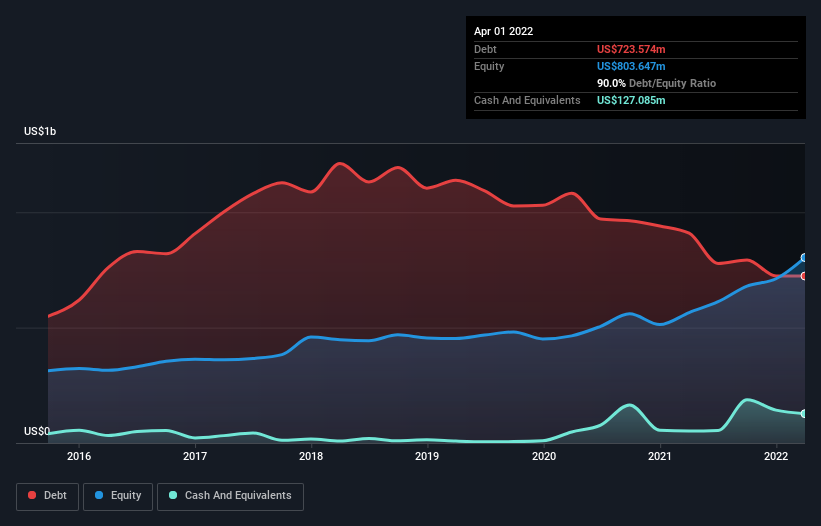- United States
- /
- Beverage
- /
- NasdaqGS:COKE
Coca-Cola Consolidated (NASDAQ:COKE) Seems To Use Debt Quite Sensibly

The external fund manager backed by Berkshire Hathaway's Charlie Munger, Li Lu, makes no bones about it when he says 'The biggest investment risk is not the volatility of prices, but whether you will suffer a permanent loss of capital.' It's only natural to consider a company's balance sheet when you examine how risky it is, since debt is often involved when a business collapses. We can see that Coca-Cola Consolidated, Inc. (NASDAQ:COKE) does use debt in its business. But is this debt a concern to shareholders?
Why Does Debt Bring Risk?
Debt is a tool to help businesses grow, but if a business is incapable of paying off its lenders, then it exists at their mercy. Part and parcel of capitalism is the process of 'creative destruction' where failed businesses are mercilessly liquidated by their bankers. While that is not too common, we often do see indebted companies permanently diluting shareholders because lenders force them to raise capital at a distressed price. Having said that, the most common situation is where a company manages its debt reasonably well - and to its own advantage. When we examine debt levels, we first consider both cash and debt levels, together.
See our latest analysis for Coca-Cola Consolidated
What Is Coca-Cola Consolidated's Debt?
You can click the graphic below for the historical numbers, but it shows that Coca-Cola Consolidated had US$723.6m of debt in April 2022, down from US$909.3m, one year before. On the flip side, it has US$127.1m in cash leading to net debt of about US$596.5m.

A Look At Coca-Cola Consolidated's Liabilities
Zooming in on the latest balance sheet data, we can see that Coca-Cola Consolidated had liabilities of US$894.1m due within 12 months and liabilities of US$1.73b due beyond that. On the other hand, it had cash of US$127.1m and US$550.7m worth of receivables due within a year. So it has liabilities totalling US$1.94b more than its cash and near-term receivables, combined.
While this might seem like a lot, it is not so bad since Coca-Cola Consolidated has a market capitalization of US$4.81b, and so it could probably strengthen its balance sheet by raising capital if it needed to. But it's clear that we should definitely closely examine whether it can manage its debt without dilution.
We measure a company's debt load relative to its earnings power by looking at its net debt divided by its earnings before interest, tax, depreciation, and amortization (EBITDA) and by calculating how easily its earnings before interest and tax (EBIT) cover its interest expense (interest cover). This way, we consider both the absolute quantum of the debt, as well as the interest rates paid on it.
Coca-Cola Consolidated has a low net debt to EBITDA ratio of only 0.91. And its EBIT covers its interest expense a whopping 14.9 times over. So you could argue it is no more threatened by its debt than an elephant is by a mouse. Another good sign is that Coca-Cola Consolidated has been able to increase its EBIT by 28% in twelve months, making it easier to pay down debt. There's no doubt that we learn most about debt from the balance sheet. But ultimately the future profitability of the business will decide if Coca-Cola Consolidated can strengthen its balance sheet over time. So if you're focused on the future you can check out this free report showing analyst profit forecasts.
But our final consideration is also important, because a company cannot pay debt with paper profits; it needs cold hard cash. So it's worth checking how much of that EBIT is backed by free cash flow. During the last three years, Coca-Cola Consolidated produced sturdy free cash flow equating to 76% of its EBIT, about what we'd expect. This free cash flow puts the company in a good position to pay down debt, when appropriate.
Our View
Coca-Cola Consolidated's interest cover suggests it can handle its debt as easily as Cristiano Ronaldo could score a goal against an under 14's goalkeeper. And that's just the beginning of the good news since its EBIT growth rate is also very heartening. Zooming out, Coca-Cola Consolidated seems to use debt quite reasonably; and that gets the nod from us. While debt does bring risk, when used wisely it can also bring a higher return on equity. The balance sheet is clearly the area to focus on when you are analysing debt. However, not all investment risk resides within the balance sheet - far from it. Be aware that Coca-Cola Consolidated is showing 2 warning signs in our investment analysis , you should know about...
Of course, if you're the type of investor who prefers buying stocks without the burden of debt, then don't hesitate to discover our exclusive list of net cash growth stocks, today.
New: AI Stock Screener & Alerts
Our new AI Stock Screener scans the market every day to uncover opportunities.
• Dividend Powerhouses (3%+ Yield)
• Undervalued Small Caps with Insider Buying
• High growth Tech and AI Companies
Or build your own from over 50 metrics.
Have feedback on this article? Concerned about the content? Get in touch with us directly. Alternatively, email editorial-team (at) simplywallst.com.
This article by Simply Wall St is general in nature. We provide commentary based on historical data and analyst forecasts only using an unbiased methodology and our articles are not intended to be financial advice. It does not constitute a recommendation to buy or sell any stock, and does not take account of your objectives, or your financial situation. We aim to bring you long-term focused analysis driven by fundamental data. Note that our analysis may not factor in the latest price-sensitive company announcements or qualitative material. Simply Wall St has no position in any stocks mentioned.
About NasdaqGS:COKE
Coca-Cola Consolidated
Manufactures, markets, and distributes nonalcoholic beverages primarily products of The Coca-Cola Company in the United States.
Excellent balance sheet with proven track record and pays a dividend.


